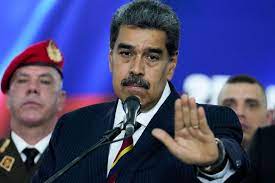
The International Criminal Court (ICC) has intensified its focus on Venezuela, where reports indicate that security forces are increasingly cracking down on dissent. The situation has drawn widespread international attention, with human rights organizations and foreign governments expressing concern over the deteriorating state of civil liberties in the country.
ICC’s Role in Monitoring Venezuela
The ICC’s involvement in Venezuela dates back several years, with investigations into alleged human rights abuses under President Nicolás Maduro’s government. The court has been particularly concerned with reports of extrajudicial killings, arbitrary detentions, and torture of political opponents and protesters.
Prosecutors at the ICC have stated that they are closely monitoring the current situation, where the crackdown on dissent appears to be escalating. The court’s mandate includes investigating crimes against humanity, and there is growing evidence to suggest that the actions of Venezuelan security forces may fall under this category.
See Here:
The Crackdown on Dissent
In recent months, Venezuelan security forces have been accused of intensifying their efforts to suppress political opposition and civil unrest. These actions include violent dispersals of protests, widespread arrests of activists, and the targeting of journalists and human rights defenders.
Critics of the Maduro government argue that these tactics are part of a broader strategy to silence dissent and maintain power amidst an ongoing economic crisis and widespread discontent. The crackdown has also been characterized by the use of excessive force, with numerous reports of human rights violations, including beatings, torture, and the use of live ammunition against unarmed civilians.
International Response and Condemnation
The international community has responded with increasing alarm to the reports emerging from Venezuela. Human rights organizations such as Amnesty International and Human Rights Watch have documented numerous instances of abuse and have called for accountability.
Several countries, including the United States and members of the European Union, have imposed sanctions on Venezuelan officials linked to the crackdown. These sanctions aim to pressure the Maduro government to cease its repressive tactics and engage in dialogue with the opposition. However, the effectiveness of these measures remains a topic of debate.
The Role of the ICC in Seeking Justice
The ICC’s ongoing monitoring of Venezuela is seen as a critical step in seeking justice for the victims of the crackdown. The court has the authority to investigate and prosecute individuals responsible for crimes against humanity, even if they are sitting government officials.
While the ICC has yet to issue any indictments, its continued scrutiny of Venezuela serves as a warning to those involved in human rights abuses. The court’s involvement also provides hope to victims and their families that there may one day be accountability for the crimes committed.
Challenges Facing the ICC
Despite its mandate, the ICC faces significant challenges in holding Venezuelan officials accountable. Venezuela is not a party to the Rome Statute, the treaty that established the ICC, which complicates the court’s ability to enforce its decisions. Moreover, the Venezuelan government has repeatedly denied any wrongdoing and has accused the ICC of political bias.
There is also the challenge of securing international cooperation in any potential prosecutions. Without the support of key global players, the ICC’s efforts to hold Venezuelan officials accountable could be severely hindered.
The Humanitarian Impact of the Crackdown
The crackdown on dissent in Venezuela has had a profound impact on the country’s population. Beyond the immediate effects of violence and repression, there are broader humanitarian concerns, including the displacement of people, the worsening economic crisis, and the erosion of basic civil liberties.
Thousands of Venezuelans have fled the country in recent years, seeking refuge from the violence and instability. Those who remain face a precarious situation, with limited access to food, healthcare, and other essential services. The crackdown has only exacerbated these challenges, leading to a worsening humanitarian crisis.
The Path Forward: International Accountability and Human Rights
As the ICC continues to monitor Venezuela, there is a growing call for stronger international action to address the situation. Human rights organizations and some governments are urging the United Nations to play a more active role, potentially through the establishment of a commission of inquiry or the imposition of further sanctions.
For the Venezuelan people, the hope is that increased international attention will lead to a cessation of the crackdown and the restoration of their rights. However, the path to justice and accountability remains uncertain, with many obstacles still to overcome.
Conclusion
The ongoing crackdown on dissent in Venezuela has prompted increased scrutiny from the ICC, highlighting the gravity of the human rights situation in the country. As international prosecutors monitor developments closely, the world watches to see whether there will be any accountability for the abuses committed by Venezuelan security forces. The outcome of the ICC’s involvement could have far-reaching implications for the future of human rights and justice in Venezuela and beyond.





